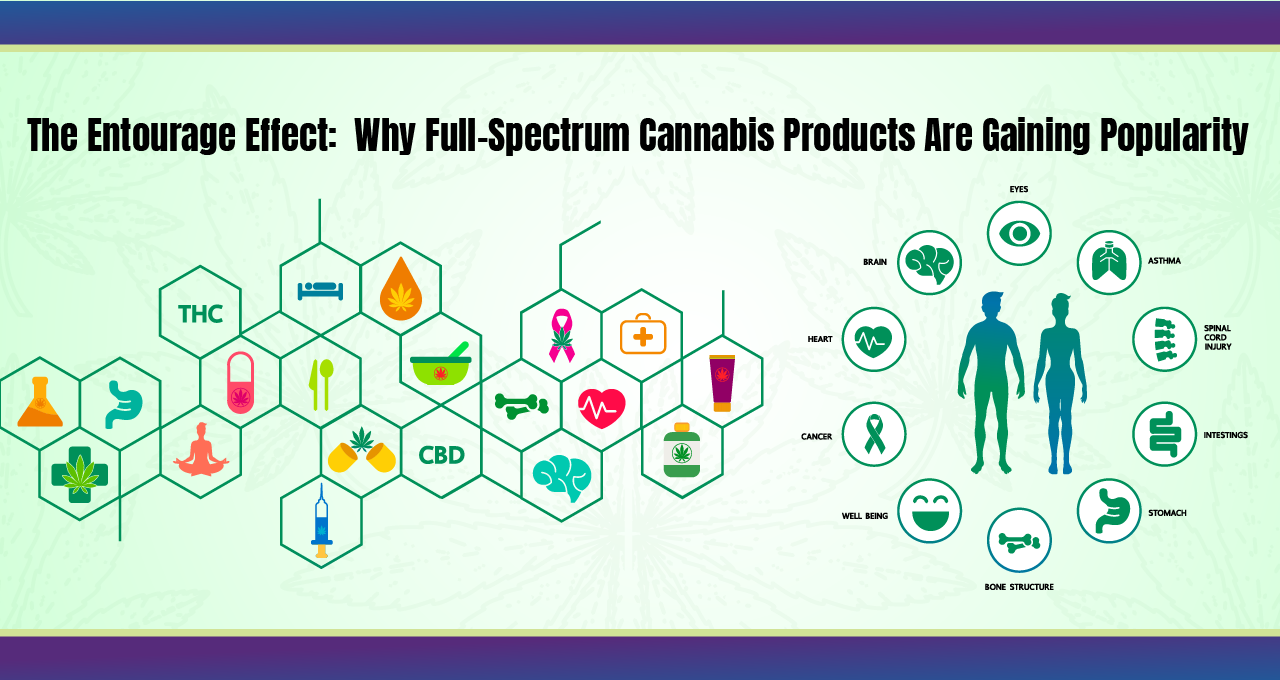02 Jan 2025
The Entourage Effect: Why Full-Spectrum Cannabis Products Are Gaining Popularity
In the ever-growing world of cannabis, one thing people are gravitating toward is full-spectrum products. Unlike isolates, which contain only THC or CBD, full-spectrum products include the full range of components from the cannabis plant—think cannabinoids, terpenes, and other natural compounds. When all of these work together, they create what’s known as the “entourage effect,” where each compound enhances the others to provide a more well-rounded, therapeutic experience.
This effect is why many people are now choosing full-spectrum over single-compound options. By harnessing the whole plant, full-spectrum products aim to offer deeper therapeutic benefits, with each compound supporting and complementing the others. This approach appeals to those looking for a fuller, more natural way to experience the potential of cannabis, where the whole truly becomes greater than the sum of its parts.
Understanding the Entourage Effect
The entourage effect describes the phenomenon where the multiple components of cannabis work together to create a greater impact than any single compound alone. Rather than isolating THC or CBD, full-spectrum products include a range of cannabinoids (like CBN, CBG, and THCV) as well as terpenes—the aromatic compounds that give cannabis strains their distinct scents and effects. When combined, these compounds interact with the body’s endocannabinoid system (ECS) in unique ways, producing a more robust and balanced effect.
Key Players in the Entourage Effect
Cannabinoids
While THC and CBD are the most famous cannabinoids, cannabis actually contains over 100 different cannabinoids, each with unique properties. Some of the most popular are:
THC (tetrahydrocannabinol) is the main psychoactive component in cannabis, responsible for the “high” feeling. Beyond its psychoactive effects, THC is valued for pain relief, anti-nausea properties, appetite stimulation, and relaxation. It can be especially helpful for people managing chronic pain, insomnia, or nausea.
CBD (cannabidiol) is non-psychoactive and known for its calming effects. CBD is popular for managing anxiety, stress relief, and inflammation. It’s also used for pain relief and seizure control, especially in certain forms of epilepsy. CBD’s ability to modulate the effects of THC makes it useful for those who want cannabis’s therapeutic benefits without a strong high.
CBG (cannabigerol) is often called the “mother cannabinoid” since it’s a precursor from which THC, CBD, and other cannabinoids are formed. CBG is thought to offer anti-inflammatory, antibacterial, and neuroprotective effects. Substances with neuroprotective properties can support brain health by reducing inflammation, preventing oxidative stress, or encouraging the repair and growth of neurons. It may also help with mood regulation and has shown promise in research for digestive conditions like inflammatory bowel disease (IBD).
CBN (cannabinol) is known as a mildly psychoactive cannabinoid, primarily recognized for its sedative effects. It’s commonly used to support sleep and relaxation, making it a popular choice in products formulated for rest and recovery. CBN also has potential anti-inflammatory and pain-relieving properties
CBC (cannabichromene) is believed to have anti-inflammatory and anti-depressant effects, as well as potential pain-relieving properties. It’s thought to work well in combination with other cannabinoids, contributing to the entourage effect and enhancing overall therapeutic benefits.
By interacting with the ECS’s cannabinoid receptors (CB1 and CB2), these cannabinoids create distinct effects. However, in combination, they work in harmony to produce more balanced and lasting effects than they might alone.
Terpenes
Terpenes are naturally occurring compounds found in many plants, responsible for the distinct aromas and flavors we associate with them. In cannabis, terpenes do more than just give each strain its unique scent; they also play a therapeutic role, often interacting with cannabinoids like THC and CBD to shape the overall effects. This interaction between terpenes and cannabinoids creates a complex experience known as the entourage effect, where the combined compounds work together to enhance each other’s effects.
Myrcene: Known for its relaxing and sedative effects, myrcene is often found in hops, lemongrass, and mangoes. It can promote calmness, reduce muscle tension, and may enhance THC’s natural sedative properties, making it popular in strains meant for relaxation or sleep.
Limonene: With a bright, citrusy aroma, limonene is believed to have mood-boosting and stress-relieving effects. Commonly found in citrus fruits, it’s often used to elevate mood, increase focus, and help manage anxiety.
Linalool: Found in lavender, linalool has a floral aroma and is valued for its calming and anti-anxiety effects. It can promote relaxation, stress relief, and may even offer pain relief, making it a good choice for unwinding.
Pinene: Known for its fresh, piney scent, pinene is found in pine trees, rosemary, and basil. It’s thought to support mental clarity, memory, and focus and may help counteract some of THC’s psychoactive effects, creating a more balanced experience.
Caryophyllene: With a spicy, peppery aroma, caryophyllene is unique as it also binds to cannabinoid receptors in the body. Found in black pepper, cloves, and cinnamon, it’s valued for its anti-inflammatory and pain-relieving properties and may help with stress relaxation and anxiety.
Humulene: Commonly found in hops and coriander, humulene has an earthy, woody aroma and is believed to have anti-inflammatory and appetite-suppressing effects, making it useful for those managing inflammation or wanting to curb hunger.
Terpinolene: With a floral and herbal scent, terpinolene is often found in nutmeg, tea tree oil, and apples. It’s believed to have mild sedative and antioxidant properties, contributing to a relaxing, mellow experience in certain strains.
Full-Spectrum vs. Isolate: What’s the Difference?
When you’re in the dispensary, like Sociale, the best dispensary in Chicago, cannabis is cannabis, right? Not exactly. There are actually different forms that can have a big impact on your experience. Two of the most common types are full-spectrum and isolate cannabis, and each one offers a unique profile of cannabinoids, terpenes, and other compounds. Understanding the difference can help you choose a product that’s best suited to your needs, whether you’re looking for a holistic, “whole-plant” effect or a pure, focused dose of a single cannabinoid.
- Full-Spectrum: Full-spectrum cannabis products contain the full array of cannabinoids, terpenes, flavonoids, and other natural compounds found in the whole cannabis plant. By preserving these compounds, full-spectrum products offer the entourage effect, giving users a balanced and comprehensive experience that can maximize therapeutic benefits.
- Isolate: Isolates, on the other hand, contain a single cannabinoid, typically CBD or THC, without any other cannabis compounds. While isolates are effective for some purposes—like focusing on the benefits of CBD without THC’s psychoactive effects—they lack the enhanced impact of the entourage effect. Some people prefer isolates for precise dosing or if they’re sensitive to certain cannabinoids, but they may miss out on the synergistic potential of full-spectrum products.
The Benefits of the Entourage Effect
Enhanced Therapeutic Potential
The entourage effect means that full-spectrum products often offer a broader range of benefits compared to isolates. For example, studies suggest that CBD and THC may work better together for pain relief than either alone, as CBD can help mellow THC’s psychoactive effects while boosting pain relief.
Balanced Effects
Because full-spectrum products deliver multiple cannabinoids and terpenes, they tend to produce a more comprehensive effect. This balance can be especially useful for those seeking relief from anxiety or chronic pain without the intense high of pure THC. The combination allows users to experience a more well-rounded range of benefits with fewer side effects.
Improved Mood and Relaxation
The terpenes in full-spectrum products enhance both the aroma and the experience of cannabis. Linalool, for instance, may contribute to a calming effect, while limonene could uplift mood. For those seeking relaxation or stress relief, the inclusion of terpenes makes full-spectrum products especially appealing.
What Science Says About the Entourage Effect
Scientific studies increasingly support the idea that full-spectrum products may be more effective than isolates for certain conditions. Research published in the journal Frontiers in Neurology suggested that full-spectrum CBD-rich extracts could provide better relief from epilepsy symptoms compared to CBD isolates, likely due to the interplay between cannabinoids and terpenes and how they affect different parts of the brain and body. Similarly, a study in Pain indicated that combining THC and CBD offered greater pain relief than either cannabinoid alone.
Choosing a Full-Spectrum Product
If you’re interested in experiencing the entourage effect, here are some tips for finding a quality full-spectrum product:
- Check for “Full-Spectrum” on Labels: Not all products are labeled as full-spectrum. Look for terms like “whole plant” or “full extract” to ensure you’re getting a full-spectrum product.
- Research Cannabinoid Ratios: Different full-spectrum products have varying cannabinoid ratios. Some products are CBD-dominant with a small amount of THC, while others have a balanced THC ratio. Choose a balance that aligns with your wellness goals and tolerance.
- Explore Terpene Profiles: Terpenes play a significant role in shaping the entourage effect. Many product labels now list the terpenes present, so consider which ones align with your desired effects. For relaxation, look for myrcene or linalool; for energy and focus, limonene and pinene are worth exploring.
- Choose a Reputable Brand: Not all products are made the same. Seek out brands that offer third-party lab testing to verify cannabinoid and terpene content to ensure a quality experience.
The entourage effect is at the heart of why full-spectrum cannabis products are becoming so popular. By extracting the whole plant, cannabinoids, terpenes, and other compounds provide full-spectrum products with a more comprehensive approach to wellness than isolates.
For those seeking pain relief, balance in mood, or anxiety reduction, the entourage effect may amplify the benefits of cannabis, allowing you to experience the plant’s full therapeutic potential.
Stop by Sociale Dispensary, an Illinois recreational dispensary to explore our premium full-spectrum products and speak to our highly experienced budtenders to find a customized product to suit your needs.




